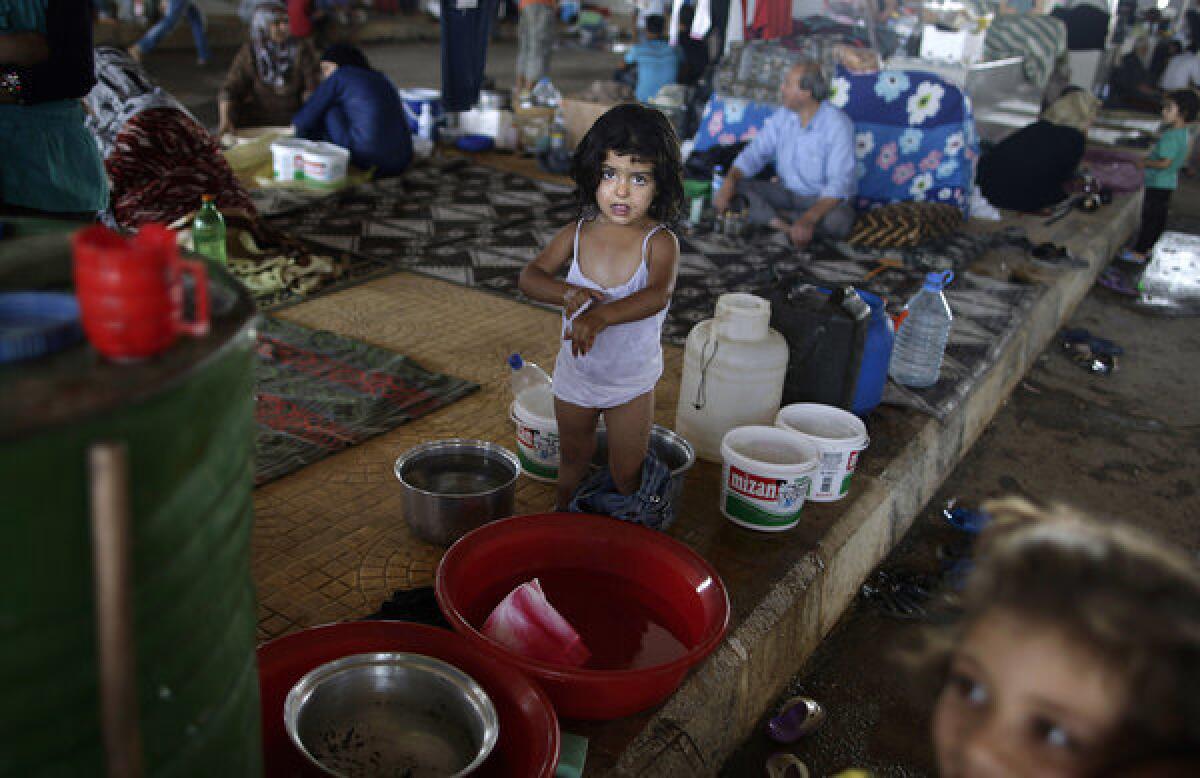U.N.: More than 9 million Syrians in dire need as winter approaches

- Share via
BEIRUT — The humanitarian crisis inside Syria is escalating rapidly with more than 9 million people — about 40% of the population — in dire need as winter approaches and agencies find it increasingly difficult to deliver aid inside the war-ravaged nation, the United Nations warns.
After more than 2 1/2 years of brutal conflict, Syria is facing a kind of humanitarian breakdown, aid workers say, with shortages of essential medicines, power, shelter, clean water and even food.
Some have expressed alarm about growing reports of malnutrition in a nation long largely self-sufficient in foodstuffs.
The World Health Organization has confirmed 10 cases of polio among babies and toddlers in eastern Syria. Immunization rates have plummeted since the war began, the organization says.
Syria had been polio-free for more than a decade until the recent outbreak, the government says. Syrian officials and authorities in neighboring Lebanon have embarked on large-scale immunization campaigns, but many people are on the move, and vast swaths of the country are lawless battle zones.
U.N. humanitarian chief Valerie Amos informed the Security Council on Monday that 9.3 million people are now in need of assistance. That represents an increase of more than a third since the last estimate, in June, the U.N. says.
Those figures include 6.5 million people who fled their homes but remain in Syria and now reside in makeshift lodging, including camps, abandoned buildings and schools. Another 2.8 million Syrians remain in their homes but face shortages of food, shelter, medical care and other essentials, the U.N. says.
The figures do not include more than 2 million people who have fled Syria, mostly settling in neighboring countries including Lebanon, Turkey, Iraq and Jordan. Meeting the humanitarian needs of refugee communities outside Syria is another major challenge.
The U.N. humanitarian chief called on the Security Council to help assure “the safe passage of medical personnel and supplies” in Syria and “unhindered delivery of humanitarian assistance.” She also urged efforts to expand “critical, life-saving relief operations,” according to a statement.
The onset of winter means legions of displaced, homeless and inadequately housed Syrians will need protection from the cold, including blankets, heaters and weather-insulated accommodation.
A major obstacle, aid workers say, is the difficulty of reaching people in contested and rebel-held zones of Syria. Food, shelter, medicines and other necessities are in many cases ready for shipment, humanitarian groups say, but delivering relief in a war zone has proved dangerous and difficult.
“Access is the main problem,” said Jens Laerke, a spokesman for the U.N.’s humanitarian affairs branch. “The minimum aid is there, pre-positioned in neighboring countries, in our warehouses.”
Gunmen in Syria have robbed relief convoys, demanded a cut of the supplies and taken drivers hostage, aid workers say.
“We have difficulties recruiting drivers for those convoys,” said Laerke, speaking by telephone from Geneva. “But it is extremely important for us to reach those in need.”
Each side in the conflict has accused the other of obstructing relief shipments.
On Monday, the Syrian government said rebel groups had hijacked aid convoys and seized medicines and other supplies meant for civilians. The opposition has accused the government of blocking aid to areas under siege in the Damascus suburbs and elsewhere, an allegation denied by Syrian authorities.
ALSO:
Trove of paintings has works looted by Nazis, masterpieces
Iran may be lowering expectations for next round of nuclear talks
Bangladesh sentences 152 former soldiers to death for mutiny killings
Twitter: @mcdneville
More to Read
Sign up for Essential California
The most important California stories and recommendations in your inbox every morning.
You may occasionally receive promotional content from the Los Angeles Times.










